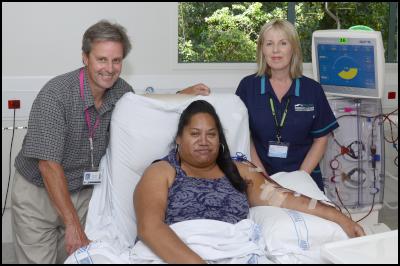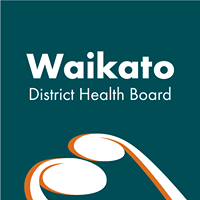Media Release
Date: Thursday, 29 November, 2012
Growing Waistlines Put Pressure On Renal Care
With photo:
Clinical director Peter Sizeland and charge nurse manager Nicky Hagan with patient Re Ngarama of Huntly in the new regional renal centre.
Other photos inside and out of centre available on request
The new Midland Regional Renal Service has a new and bigger base at Waikato Hospital, and it’s desperately needed, says clinical director Peter Sizeland.
The Regional Renal Centre covers all renal failure and dialysis services for most of the Midland region, incorporating Lakes, Bay of Plenty, Waikato and Tairawhiti DHBs.
The growing waistlines of New Zealanders are putting increased pressure on renal replacement services, Dr Sizeland says.
“We are a nation that is getting fatter. We have issues with chronic diseases and major health challenges associated with obesity. The major cause of kidney failure requiring dialysis is diabetes and more recently there has been an increase in the number of older people being accepted into the dialysis programme.
“We needed a new renal unit to match the burgeoning waistlines of our patients and this state-of-the-art facility will serve our patients now and into the future,” he said as the new centre opened on Monday. (Nov 26)
The Midland Regional Renal Unit spent 19 years in the old unit but now cares for about three times the number of patients it did when the dialysis unit first opened. “So we outgrew the old facility years ago and we have been fortunate to have DHB management with the good sense and vision to plan for this bigger facility.
“We now have more space and dialysis stations and a safer clinical environment for patients and staff.”
The centre cost $7.6 million, and has more than twice the number of dialysis treatment stations, with 30 potentially available and 24 currently in use. It has moved just down the road within the hospital grounds to the refurbished Lions Cancer Lodge, which is now located at the former Braemar Hospital site in Hamilton.
The approach of the service continues to support and encourage patients requiring dialysis to be home-based if at all possible.
“Patient autonomy is a philosophy of the renal unit. There is good evidence that patient outcomes are improved with home-based dialysis. We have excellent systems in place to support patients and their families so that patients are able to carry out their dialysis in their own homes.”
While Dr Sizeland says the unit fits the “ambulance at the bottom of the cliff” comparison he hopes new pathways in primary and secondary health care may reduce the number of people requiring renal treatment. He’s keen to see a screening programme “because half of the people with diabetes don’t know they have the disease”. In addition, people with diabetes need to be screened for complications, and strategies put in place to prevent complications occurring. Even if patients have complications there are treatments available to slow down their decline in health.
“Diabetes is a dreadful disease – it causes circulation problems, nerve damage, and eye and kidney damage. We have interventions to slow down the rate of complications and their implementation requires an integrated care partnership shared between the primary, secondary and tertiary health providers.
“So we are looking after more and more patients which largely reflects the number of diabetic and older patients with kidney issues.’’
Most of the centre’s patients have kidney failure, with 65 per cent of the dialysis patients suffering diabetes and 95 per cent of these patients have obesity-related Type II diabetes.
The centre runs as a central hub with satellite dialysis units at Tauranga, Rotorua, Whakatane and Gisborne. The Midland Regional Renal Service is the largest multi-district health board renal service in New Zealand. “We are unique because we look after such a huge area.”
This does put pressure on the clinical staff, particularly the renal physicians and registrars who frequently fly to Whakatane and Gisborne and drive to Tauranga and Rotorua to provide outreach clinics. “All the clinical staff are passionate about supporting patients with renal disease, particularly the doctors who could fairly be considered supermen and woman. They should be wearing a cape and underwear on the outside of their pants to signify their superhuman status.”
Dr Sizeland says the strength and backbone of the service is the clinical staff. “The local team are committed, passionate and professional. We have a multi-disciplinary approach to patients with kidney disease which includes doctors, nurses, social workers, kaitiaki and specialist dieticians.
“The network of regional specialist renal nurses are equally skilled and focused about wanting to make a difference to our patients’ lives. This requires a broad and comprehensive care plan that effectively supports the patients and their families.”
While there is much work to do Dr Sizeland is confident the team have the resources to take renal care in the region ahead.
“The investment in the new centre is a vote of confidence in us and our work across the Midland region.
“We are a good service but we wish to be even better. This new facility will further encourage the staff to strive for excellence and be innovative clinical leaders of renal medicine in New Zealand.”
*Health Minister Tony Ryall will visit the new centre tomorrow. (Nov 30)
BY THE NUMBERS
The new renal centre has:
• Around 480 patients on dialysis
treatment
•
• 250 pre-dialysis patients who
require close monitoring and management of which around 65
per cent are diabetic.
•
• Facility
haemodialysis with 30 ports/stations instead of the current
12 ports/stations and a central water treatment
plant
•
• The Peritoneal Dialysis (PD) Training
Unit covers all PD training for the Midland region and there
are currently 218 patients
•
• Eight ports at a
home haemodialysis training centre. The home haemodialysis
training centre is one of the largest in New Zealand with
around 90 patients doing home-based haemodialysis throughout
the region
•
• Transplant co-ordinators. More
than 200 kidney transplant recipients and donors are dealt
with through this service
•
• 75 staff have moved
into the new facility., including specialist nurses, social
workers, dieticians, technicians
•
--
Check out our media releases on www.waikatodhb.health.nz/news or
About Waikato District Health Board and Health Waikato:
Waikato DHB is responsible for planning, funding and providing quality health and disability support services for the 372,865 people living in the Waikato DHB region. It has an annual turnover of $1.2 billion and employs more than 6000 people.
Health Waikato is the DHB’s main provider of hospital and health services with an annual budget of more than $701 million and 5238 staff. It has six groups across five hospital sites, three primary birthing units, two continuing care facilities and 20 community bases offering a comprehensive range of primary, secondary and tertiary health services.
A wide range of independent providers deliver other Waikato DHB-funded health services - including primary health, pharmacies and community laboratories.

Renal team
ENDS



 Tertiary Education Union: Weltec And Whitireia Cuts A Shocking Blow For Their Communities
Tertiary Education Union: Weltec And Whitireia Cuts A Shocking Blow For Their Communities PHARMAC: Pharmac Proposes To Fully Fund Nutrition Replacements For Some People With Crohn’s Disease
PHARMAC: Pharmac Proposes To Fully Fund Nutrition Replacements For Some People With Crohn’s Disease Nōku Te Ao: Bringing Together Voices On Mental Distress, Stigma And Discrimination Under One Roof
Nōku Te Ao: Bringing Together Voices On Mental Distress, Stigma And Discrimination Under One Roof Office of Early Childhood Education: Early Childhood Education Sector Confidence Survey Results 2025
Office of Early Childhood Education: Early Childhood Education Sector Confidence Survey Results 2025 Bikesport NZ: Intrepid Kiwi Teen Ready To Accept New Challenge
Bikesport NZ: Intrepid Kiwi Teen Ready To Accept New Challenge Wellington Access Radio: Young People Take Over Wellington Access Radio For Youth Broadcasting Week 2025
Wellington Access Radio: Young People Take Over Wellington Access Radio For Youth Broadcasting Week 2025